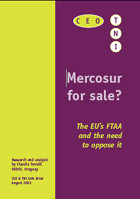Mercosur for Sale? The EU's FTAA and the Need to Oppose it
Regiones
Negotiations on a free trade agreement between the European Union (EU) and the Mercosur countries (Argentina, Brazil, Paraguay and Uruguay) have entered their decisive stage.

Autores
Negotiations on a free trade agreement between the European Union (EU) and the Mercosur countries (Argentina, Brazil, Paraguay and Uruguay) have entered their decisive stage. Beyond its pro-development rhetoric, the EU's primary goal is to secure markets for European corporations, in the competition with the US over control of Latin America.
This explains the influence of the Mercosur-European Business Forum (MEBF), which urges governments to further deepen the process of deregulation, privatisation and liberalisation which has swept the region in the 90s, with dramatic social and environmental consequences.
Argentina, Brazil, Paraguay and Uruguay have since 1991 worked on creating the Southern Common Market, Mercosur. (1)Since mid-2000, these countries have been engaged in negotiations with the EU to establish a free trade area covering both regions. In comparison with the intense controversy around the Free Trade Area of the Americas (FTAA) talks, involving the whole of North and South America (except for Cuba), it has been relatively quiet around the EU-Mercosur process.
Why is it that networks like the Hemispheric Social Alliance (HSA) successfully mobilise millions of people against the US-driven FTAA (2), whereas the EU-Mercosur talks are relatively unknown even within the activist communities in both Europe and Latin America? Civil society engagement in the EU-Mercosur process, largely limited to conferences and government-hosted ‘dialogue' events, has until now lacked the confrontational attitude known from the FTAA debate. (3)
Pages: 17